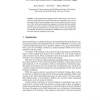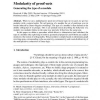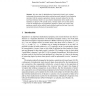137
Voted
ENTCS
2000
15 years 2 months ago
2000
Abstract. Logic programming languages based on linear logic are of both theoretical and practical interest, particulaly because such languages can be seen as providing a logical ba...
95
Voted
AML
2005
15 years 2 months ago
2005
When we cut a multiplicative proof-net of linear logic in two parts we get two modules with a certain border. We call pretype of a module the set of partitions over its border indu...
139
Voted
ENTCS
2006
15 years 2 months ago
2006
This paper has the purpose of reviewing some of the established relationships between logic and concurrency, and of exploring new ones. Concurrent and distributed systems are noto...
123
Voted
ENTCS
2006
15 years 2 months ago
2006
We build a realizability model for linear logic using a name-passing process calculus. The construction is based on testing semantics for processes, drawing ideas from spatial and...
108
Voted
ENTCS
2008
15 years 2 months ago
2008
We describe some results inspired to Lafont's Soft Linear Logic (SLL) which is a subsystem of second-order linear logic with restricted rules for exponentials, correct and co...
117
Voted
ENTCS
2010
15 years 2 months ago
2010
Focalization property is a deep outcome of linear logic proof theory, putting to the foreground the role of polarity in logic. It resulted an important advances in various fields, ...
116
Voted
CORR
2010
Springer
15 years 2 months ago
2010
Springer
We show that for Multiplicative Exponential Linear Logic (without weakenings) the syntactical equivalence relation on proofs induced by cut-elimination coincides with the semantic ...
89
Voted
CORR
2010
Springer
15 years 2 months ago
2010
Springer
In our paper "Uniformity and the Taylor expansion of ordinary lambda-terms" (with Laurent Regnier), we studied a translation of lambda-terms as infinite linear combinati...
107
Voted
APAL
2007
15 years 2 months ago
2007
In this paper, we present a categorical model for Multiplicative Additive Polarized Linear Logic MALLP, which is the linear fragment (without structural rules) of Olivier Laurentâ...
113
Voted
APAL
2010
15 years 2 months ago
2010
The description of resources in game semantics has never achieved the simplicity and precision of linear logic, because of the misleading conception that linear logic is more prim...



